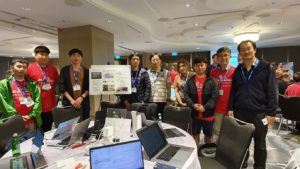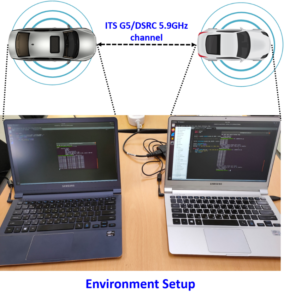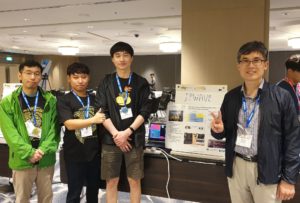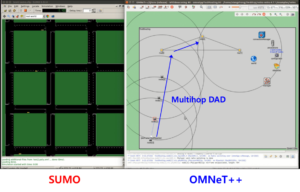 The author of this blog is Jaehoon (Paul) Jeong. Paul is an associate professor in the Department of Computer Science and Engineering at Sungkyunkwan University, Republic of Korea.
The author of this blog is Jaehoon (Paul) Jeong. Paul is an associate professor in the Department of Computer Science and Engineering at Sungkyunkwan University, Republic of Korea.
IPWAVE is a working group in the IETF Internet Area to standardize IPv6-based vehicular networking. IPWAVE stands for IP Wireless Access in Vehicular Environments. The IPWAVE working group produced a document titled, “Basic Support for IPv6 over IEEE Std 802.11 Networks Operating Outside the Context of a Basic Service Set” (draft-ietf-ipwave-ipv6-over-80211ocb-52), which defines methods and settings for using IPv6 to communicate among nodes within range of one another over a single IEEE 802.11-OCB link. This document is in the RFC editor queue and will soon be published as a Proposed Standard RFC. It will be a cornerstone for IPv6-based vehicular networking. The IPWAVE working group also documented the problem statement and use cases for IPWAVE (draft-ietf-ipwave-vehicular-networking-12) as an Informational RFC. This document will be used as a base document for the rechartering of the IPWAVE working group for protocol development. The major problems called out in this document are:
- IPv6 Neighbor Discovery
- IPv6 Mobility Management
- Security & Privacy for IPWAVE
IETF hackathon accelerates working group efforts
The IEFT Hackathon provides a unique and valuable opportunity to focus on the development and testing of software related IETF working group documents as they progress through the standardization process. In the case of IPWAVE, the IETF Hackathons have played an important role in accelerating the pace and enhancing quality of the working group’s efforts. Starting in 2015 when Cisco DevNet sponsored and ran a hackathon at an IEFT meeting for the first time, the hackathons have now become the official start of each IETF meeting. Cisco DevNet continues to run the hackathons, and IPWAVE and many other IETF working groups take full advantage of the opportunity to spend time on running code in parallel with standards documents. Charles Eckel’s blog has more information on IETF 106 hackathon.
The IPWAVE hackathon team is working on IPWAVE basic protocols, such as IPv6 over IEEE 802.11-OCB, IPv6 Neighbor Discovery, and IPv6 Mobility Management. This team consists of contributors (e.g., Yiwen (Chris) Shen (Sungkyunkwan University, SKKU) and Jaehoon (Paul) Jeong (SKKU)) and other participants (e.g., Hyojoon Han (Dongguk University)). Figure 1 shows our IETF-106 IPWAVE hackathon project team and participants.
 Figure 1. IETF-106 IPWAVE Hackathon Project Team
Figure 1. IETF-106 IPWAVE Hackathon Project Team
This team worked for IPv6 data delivery over IEEE 802.11-OCB in the IETF 106 Hackathon in Singapore. The team demonstrated IPv6 Packet Transmission over IEEE 802.11-OCB for V2V (vehicle to vehicle) communications of two laptops with a COTS (Commercial off-the-shelf) WiFi device. Figure 2 shows IETF 106 IPWAVE hackathon project demonstration of video streaming delivery over IPWAVE. Atheros 802.11 WiFi module and Linux IEEE 802.11p were used to deliver real-time webcam streaming between two laptops (regarded as vehicles), and showed the possibility of IPWAVE in IPv6-based vehicular networks. Though the current IPv6 Neighbor Discovery (ND) does not support the IPv6 Stateless Address Autoconfiguration (SLAAC) for a global-scope prefix and neighbor cache population, this team will work for the support of the IPv6 ND and SLAAC in the next hackathon. The GitHub repository of the IPWAVE hackathon project is https://github.com/ipwave-hackathon-ietf. A video clip for the IETF 106 IPWAVE hackathon demonstration can be found at https://youtu.be/gQxOLU740b4.
Also, in the Hackdemo Happy Hour during the IETF 106 week, the team explained and demonstrated the IPWAVE hackathon project to the IETF community. Many people had great interest in the project and encouraged the team to continue to enhance it. Figure 3 shows the IPWAVE hackathon project booth in IETF 106 Hackdemo Happy Hour.
 Figure 2. IETF 106 IPWAVE Hackathon Project Demonstration
Figure 2. IETF 106 IPWAVE Hackathon Project Demonstration
 Figure 3. IPWAVE Hackathon Project Booth
Figure 3. IPWAVE Hackathon Project Booth
at the IETF 106 Hackdemo Happy Hour
In IETF 104 and IETF 105 hackathons, the IPWAVE hackathon team implemented and demonstrated the IPWAVE Vehicular Neighbor Discovery (VND) in the simulation using OMNeT++ and SUMO. (See Figure 4). Note that OMNeT++ is a data network simulator for vehicular data traffic, and SUMO is a road network simulator for vehicle mobility. Through this simulation, the effectiveness of the Vehicular Neighbor Discovery was shown, which uses a multi-hop Duplicate Address Detection (DAD) and IPv6 address registration with the vehicular cloud. Chek out the video clip for the IETF 105 IPWAVE hackathon demonstration.
 Figure 4. IETF-105 IPWAVE Hackathon Project Demonstration
Figure 4. IETF-105 IPWAVE Hackathon Project Demonstration
Thus, the IETF hackathon is accelerating the IPWAVE standardization since the IPWAVE open-source project can verify the proposed IPWAVE protocols with either simulation or real system implementation. Furthermore, the IPWAVE hackathon team will engage software engineers of automotive vendors (e.g., Hyundai Motors) for real deployment in the IETF 107 hackathon.
We’d love to hear what you think. Ask a question or leave a comment below.
And stay connected with Cisco DevNet on social!
Twitter @CiscoDevNet | Facebook | LinkedIn
Visit the new Developer Video Channel

CONNECT WITH US